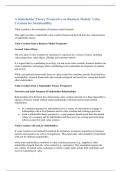A Stakeholder Theory Perspective on Business Models: Value
Creation for Sustainability
Value creation is the centerpiece of business model research
This paper provides a stakeholder value creation framework derived from key characteristics
of stakeholder theory.
Value Creation from a Business Model Perspective
Created Value (What)
The core idea of value creation for customers is expressed in a variety of terms, including
value proposition, value object, offering, and customer benefit
It is argued that by contributing to ecologi- cal and social value creation, business models can
create competitive advantages while contributing to the sustainable development of markets
and society
While conventional frameworks focus on value created for customers and the focal business,
sustainability- oriented frameworks also include ecological and social out- comes that benefit
other stakeholders.
Value Creation from a Stakeholder Theory Perspective
Networks and Joint Purposes of Stakeholder Relationships
Relationships form the basis for a functioning value creation network. It is thus impossible to
operate a business model without sound relationships with both internal and external
stakeholders.
• In a relational perspective stakeholders have a variety of motivations to engage in
relationships with a focal business and its value creation and exchange processes
• From a stakeholder theory perspective, a joint purpose should result from the shared
values of a company and its stakeholders and thus serves as a strong and motivating
reference point for joint value creation
Value Creation with and for Stakeholders
If value creation is not mutually beneficial for all parties, a business would lose its business
partners and resources as well as its legitimacy. This means that value should be created both
with and for different stakeholders.
while some stakeholders contribute to value creation processes (e.g., suppliers), other
stakeholders benefit from the value created (e.g., customers). This assumption ignores the
pos- sibility of mutual value exchanges in which a single stake- holder both contributes and
receives something of value.
,Developing a Stakeholder Value Creation Framework
Business models should be designed, developed, and realized in relationships between a
business and its stakeholders. A theory-based stakeholder value creation framework therefore
needs to analyze relationships as a theoretical foundation for the involvement of different
stakeholders in business models. A further central element to the framework is a joint
purpose behind which stakeholders engage in the business model. These two elements
constitute a major difference between business models based on a stakeholder theory
perspective and those solely built around a (customer) value proposition
Customers
Stakeholder theory sees customers as active participants in a business model. They do not
merely pay for a product or service, but also provide other values to the business, for
example, personal data and information about consumption preferences, thus helping to meet
a business need for detailed information about the target group. . They may also be involved
in value creation processes, for example, by individualizing product designs or participating
in open innovation initiatives.
Business Partners
relates to the creation of the product or service, including its research and development,
procurement of inputs, and actual production processes. Stakeholder contributions fulfill
business needs related to production processes in return for payment and also opportunities
for recurring contracts or other non-monetary benefits they consider to be valuable
Employees
Employees are engaged in value crea- tion activities in this dimension by providing their
knowl- edge and capabilities to the focal business.
Societal Stakeholders
The value provided by societal stakeholders includes the provision and maintenance of a
stable operating environment for the business through regulations and social norms
Financial Stakeholders
Financial stakeholders thus include both internal equity and debt capital providers (e.g.,
employees as stockholders- ers, shareholder loans) and external (e.g., stock market
shareholders, bank loans).
Implications of the Framework
Firstly, it provides a nuanced understanding of stakeholder relationships and of what
constitutes value.
Secondly, each relationship and its related mutual value exchange contribute to overall value
creation in the business model, which in turn leads to a portfolio of value.
, Thirdly, the focus on all types of value, of which finan- cial value is only one, provides a
richer basis for devel- oping business models for sustainability.
Summary and Conclusions
The proposed stakeholder value creation framework struc- tures the relationships between a
company and its stakehold- ers along five dimensions of a company’s business model
Popai:
They argue that traditional business model frameworks often focus on value creation as a
one-way flow between the business and its customers, neglecting the role of other
stakeholders. The authors propose a stakeholder value creation framework that takes into
account the mutual relationships and value exchanges between the business and its
stakeholders.
The framework aims to support the analysis and management of business models for
sustainability, where value creation is not limited to financial outcomes but also includes
ecological and social value
1. Stakeholder Groups: The framework identifies five main stakeholder groups:
customers, suppliers, employees, financiers, and societal stakeholders. These groups
represent the different actors involved in the business model and their relationships
with the focal business.
2. Relationships: The framework emphasizes the importance of relationships between
the focal business and its stakeholders. These relationships are characterized by
mutual value exchanges and a joint purpose. The framework recognizes that
stakeholders contribute to value creation activities and are not just recipients of
value.
3. Value Exchanges: Each stakeholder group engages in value exchanges with the focal
business. These exchanges involve the creation and exchange of different types of
value, such as financial, social, and ecological value. The specific types of value
created may vary for each stakeholder group.
4. Joint Purpose: The framework highlights the need for a joint purpose that aligns the
interests of the business and its stakeholders. This purpose serves as a guiding
principle for the involvement of different stakeholders in the business model.
5. Value Portfolio: The framework views value creation as a portfolio of different forms
of value, rather than a single outcome. It recognizes that value is created for both the
business and its stakeholders, and that the value created may differ for each
stakeholder group.





